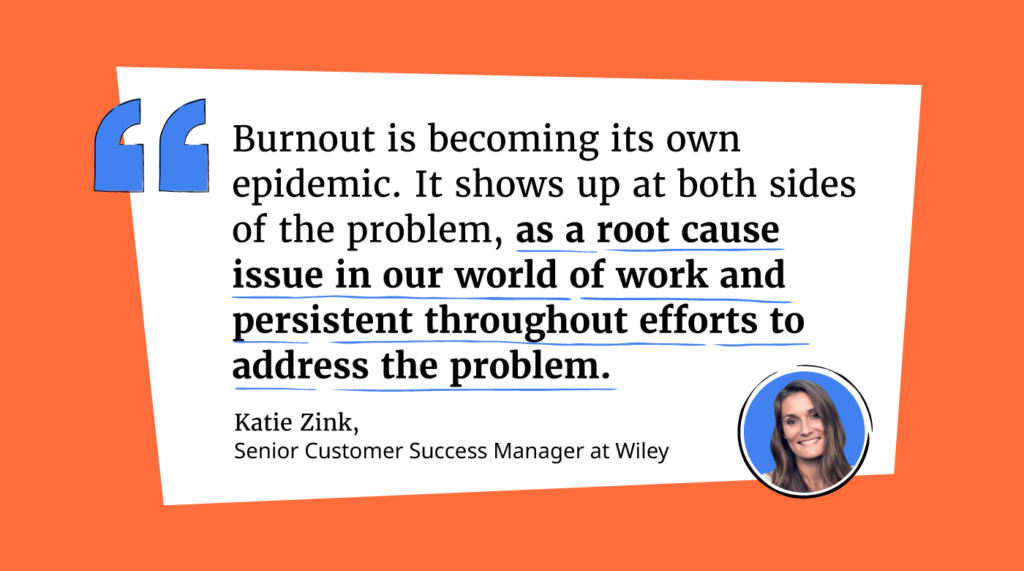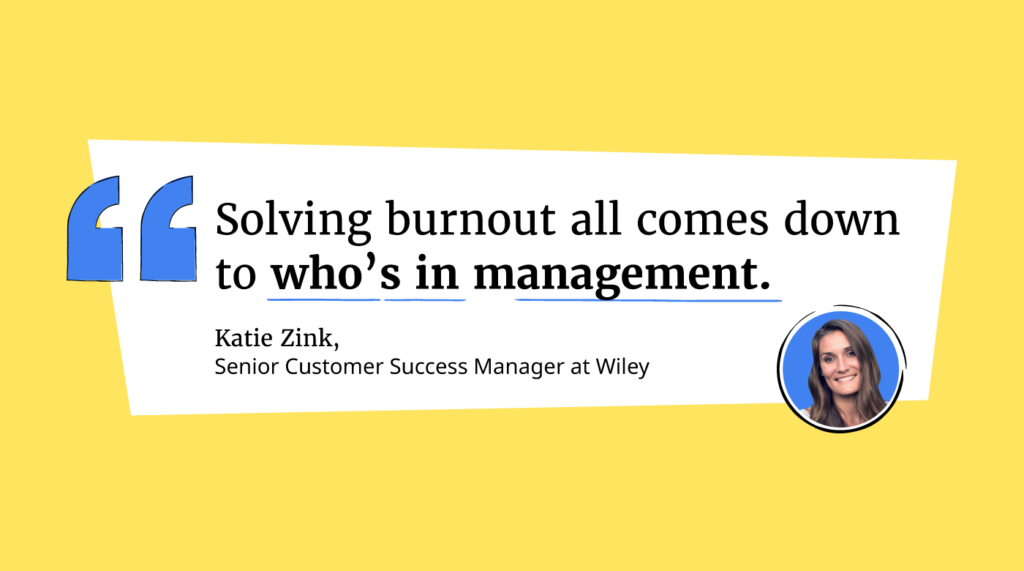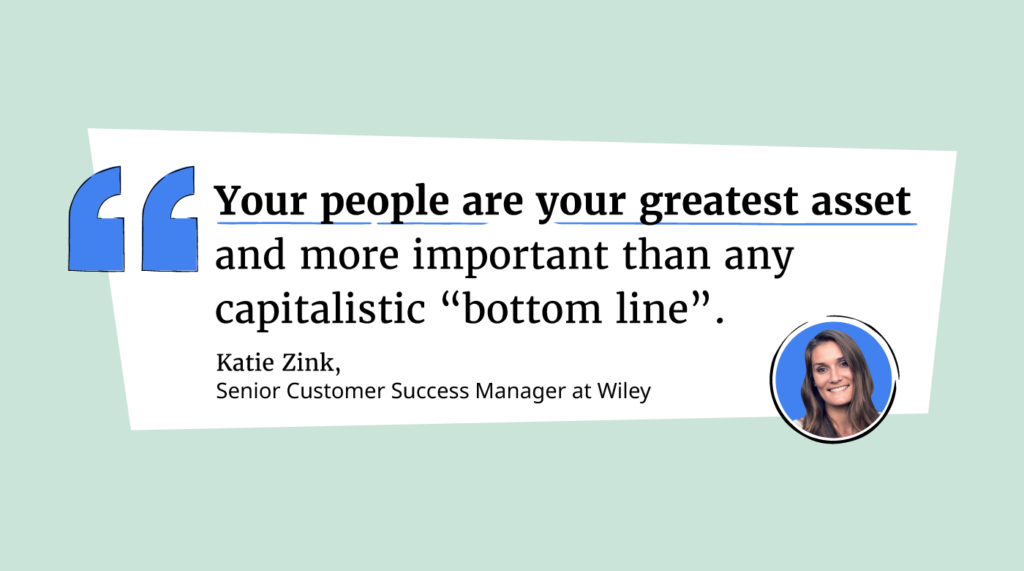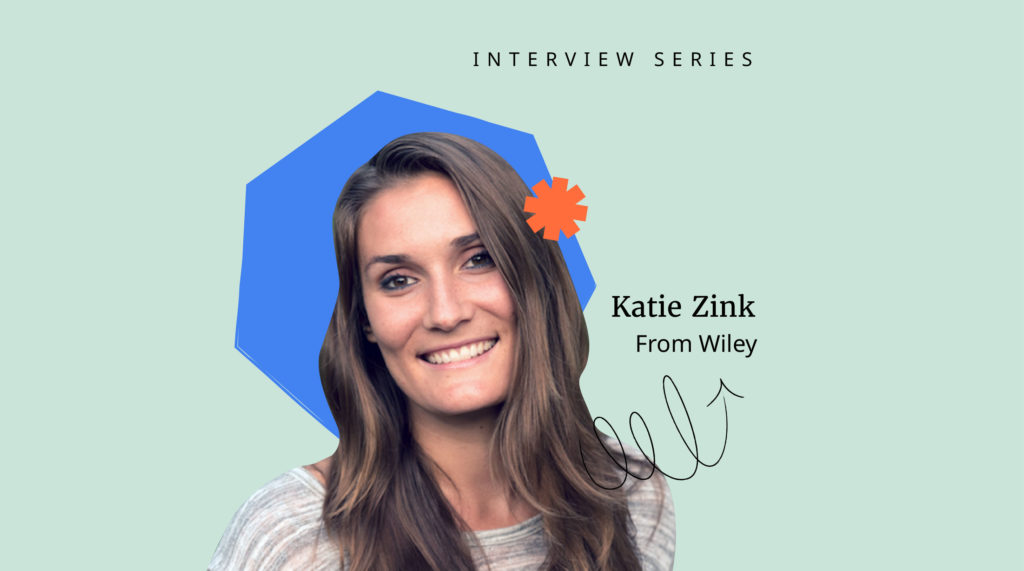We’re passionate about the world of work, and how we can make it better. To help satisfy our curiosity, we’ve launched an interview series where we pick the brains of experienced leaders, business owners, managers, and individual contributors to get their thoughts on how we can collectively build better.
We’d love to get to know you a bit better, tell us a bit about your backstory.
Born and raised in Atlanta, Georgia, I graduated from highschool in 2006 and attended the University of Colorado at Boulder. I was lucky to learn to ski at a young age and I fell in love with Colorado and everything about it.

I graduated from college in 2010 and two years into the 2008 economic downturn with a Bachelor’s Degree in Communications and Minor in Women and Gender Studies. Back then, all anyone could talk about was how rough the job market was and how seasoned candidates with Master’s Degrees were competing with new graduates for entry-level jobs. So, I escaped to ski country to wait out the recession.
You could have called me a ski bum, but I was usually working 2-3 jobs. I worked various kinds of hospitality jobs from fine dining to bowling alleys and managed to save up enough money to move to Portland, Oregon in 2013.
Once in Portland, I continued to work in food and beverage and had dreams of working in wine country. I was working in one of the top Portland restaurants and a very stressful, high-pressure working environment.
For the few months I’d worked there, I was dealing with pervasive sexual harassment both from the restaurant’s owner and the clientele. I reported the harassment to the Restaurant Group Investors and was let go from my job a few days later. Sadly, this wasn’t the only instance of harassment, discrimination, inappropriate conduct, or bias in my food and beverage career and is a very common thing that happens to women in general, but that’s a different interview.
I quickly found myself seeking completely new opportunities within Portland’s tech industry. Transitioning out of the service industry is easy for no one, and fortunately, many resources were in place to support women like me entering the tech industry in Portland. Organizations like PDX Women in Tech helped me along the way. If you’re transitioning careers and have a similar organization where you live, I highly recommend getting involved.
After three months of job searching, I found myself working in tech from the relationships I’d built. I was willing to take the not-so-glamorous jobs and I had developed really good people skills (thank you, service industry).
I started out selling Microsoft products at an IT reseller. I knew nothing about IT, but I loved getting to know my customers and loved my colleagues. My manager and colleagues started to notice how well I was performing toward my sales goals. This landed me an even better job at a company with a mission I was much more passionate about.
From there, I developed new passions, skills, and became known as a natural leader and recognized for my talents. I was promoted twice in two years and was happily working as a Customer Success Manager.
I loved the work I was doing but I struggled with a lack of mentorship. I was working for a boss who favored certain people on the team and invested more of his time, praise, and attention for some folks more than others. Because of this, I looked for support elsewhere and I started looking inward on how I could invest in my own professional growth. I sought support from my peers as well as other women like me who could empathize with how a lack of mentorship felt and who also valued growth. From those discoveries, I learned how to become a better writer and that earned me more recognition and praise from my boss.
This led me to consider another career change to Marketing. The company had brought in a new Marketing Director and we immediately hit it off. Within a week, she had invited me to apply for an open role on her team.
This was a major pivot for me, despite my qualifications for the role. The transition from Customer Success to Marketing can be a smart one, as being the customer’s advocate is hugely beneficial to a marketing team. It requires a completely different and highly analytical skill set from Customer Success, which I quickly realized not long after I took the leap.
I’ll be honest with you. I was miserable! I didn’t feel like I was adding value to the team and was completely overwhelmed by the new jargon, language, priorities, and responsibilities. It was almost an entirely new team, so the capacity for mentorship was slim. I quickly learned how much I value and need a nurturing and supportive team culture in order to thrive. I did the role for almost a year, before deciding to pivot again.
This time, it was my loving partner who approached me with the idea. He’d seen how unhappy I’d been and wanted me to find my passion again. I realized that this time, it was business ownership and going into work for myself.
Because of the relationship I’d built with leaders, managers, and peers, I had the full support of my company to go off and chase my new passions as a business owner.
Little did we know, a pandemic and social reckoning would be right around the corner.
Even with the pandemic, I was fully immersed in my passions full time, and I learned what’s hard about that. I cared so deeply about the work I was doing and felt totally represented by it. I got to work on some incredible projects and ultimately felt so fulfilled.
Starting a new business in the time of Covid had its challenges. I believed the work I was doing was increasingly important during those times, but my barely established brand ultimately couldn’t sustain, and I found myself ready for another pivot, but this time, it was back to the tried and true, Customer Success. I was quickly recruited by an established publisher to join their Customer Success team and I haven’t looked back (yet).
If we were to ask a friend to describe your personality to us, what would they say?
Passionate, natural leader, and risk-taker.
Thinking back to your career journey, what’s an interesting story that stands out?
I’ve made many career pivots. None of them were easy, but all of them were worth it.
Early in my professional career, I was lucky enough to work with a career coach. She helped me in ways she didn’t even realize. She was the first person who told me about LinkedIn, helped me with my resume, and taught me how to network. Through her, I met many amazing women I’m still connected with today.
My relationship with this coach evolved into many different things. Eventually, I would go on to attend and volunteer for career summits she hosted. From her summit, I became inspired to start taking the steps to pivot from Customer Success and become an entrepreneur.
I ended up reconnecting with her for some more coaching after the summit. She helped me put my initial business plan in place, launch my first website, and she introduced me to her personal network of business owners. The following year at the summit, she let me do some pro bono consulting work that would result in a case study she’d provide for my services.
But, after all of that, I zigged instead of zagged—I took that job in Marketing, instead.
Another year later, when I finally was ready to launch my business, I worked with a different coach to get it started—a coach she’d introduced me to years before who specialized in building signature services.
I was able to focus full time on my business and absolutely loved it. I put my whole heart into my work and learned so much.
When I made the ultimate decision to pivot again back to Customer Success, I asked her to meet up with another mutual friend of ours and client of mine she’d had introduced me to years before. I knew she had also pivoted from her coaching business and went back to work full time at a non profit.
After a few glasses of wine, she ended up telling me that quitting my business was the right thing to do and she was glad to hear that I went back to work with an established company.
All I could think was, wow, this seems like something a career coach would have advised me with before I went down all those paths.
All things considered, I’m glad she didn’t.
Goes to show, you can hire career coaches, network your ass off, pay professionals to write up your resume and LinkedIn profile, but no one knows what they’re doing out here! None of it can matter or some of it can matter, but my point is,
If you can learn to pivot, accept feedback gracefully, and trust that all your experiences will lead you to the next one, you’ll be just fine.
Katie Zink
What’s the most impactful lesson you've learned over your career thus far?
Pivots are hard but worth it. Try everything. It’s good to seek out what you’re passionate about, but it also doesn’t have to be what you do full time. Eventually, if you try enough things, you’ll learn what you’re good at, what you like, what you don’t like, and what you can be successful in. Let others see your greatness, but remember, only you define your version of success.
Thanks for giving us some insight into who you are! Let’s jump into things. When you hear the phrase “build a better world of work”, what comes to mind?
A better world of work means that people truly have their needs met.
I recently became licensed to present the work of Paloma Medina. She has an amazing body of work around equitable and inclusive workplaces.
In her work, she presents six core needs that every person has.
- Belonging
- Community: A feeling of friendship and closeness with a group, or being part of a tight community of any size.
- Community well-being: People are cared for; The whole group feels happy and healthy.
- Connection: Feeling kinship and mutual understanding with another person.
- Improvement
- Progress: Your daily work creates progress towards an important goal for the company, your team, or your own career/ life.
- Improving the lives of others: You see how your work helps improve things for others.
- Personal growth: Learning/ seeing fast growth in yourself in skills that matter to you.
- Choice
- Choice: Having flexibility, the chance to have more control over key parts of your world.
- Autonomy: Having clear ownership over a domain where you can do as you wish, without asking for permission.
- Decision-making: The ability to make decisions about the things that matter to you.
- Equality/ Fairness
- Access to resources (money, time, space, etc) feels fair/ equitable.
- Access to information feels fair: All groups/ people have access to information that is relevant to them.
- Equal reciprocity: You support each other equally.
- Decisions are fair and everyone is treated as equally important.
- Predictability
- Resources: There’s enough certainty about resources (money, personnel hours, space) so you can focus on your job or goals.
- Time: There’s certainty about when things will occur/ when you can prepare for them.
- Future challenges: You can anticipate and thus can prepare for future challenges.
- Direction: Goals, strategy, and direction stay consistent and don’t change too often/fast.
- Significance
- Your work feels like it has a clear sense of purpose.
- You see how you or your work fit into a positive goal or mission.
- You feel part of an important, positive movement or group.
For you, what’s the main blocker you see as standing in the way of building a better world of work?
The unwillingness to acknowledge, understand, or address burnout.
I was recently eating lunch with a friend who was the former Executive Director in a highly visible non profit working to build a better tech industry. When talking about how we can propel this work forward in our communities, she used the term “collective burnout” to describe why the work stalls out.

We still have much to understand about burnout and how to effectively manage it in the workplace, but we do know that the core needs I mentioned above can definitely help with the emotional components of burnout.
What steps do you recommend someone take in order to remove this blocker?

Among the many resources out there to help managers with this, Paloma Medina also has practical tips for managers to better understand how the core needs are (or aren’t) showing up on their team.
Before getting licensed by Paloma Medina, I took a year-long course on Inclusive Management from a team of Organizational Consultants at Future Work Design, which I highly recommend. So, there’s much to know on the subject!
Managers: Have a plan to not only address burnout, but learn how to truly understand how it’s affecting the individuals on your team, so that it’s not so perpetual.
Create a space where it’s safe to ask your team:
1) Are they burnt out? (and let’s be honest, who isn’t?)
2) How do they take care of themselves to manage burnout?
3) What could the company (or at least management) do to help people with their burnout?
It’s not about spreading negativity, it’s about facilitating our wellbeing. If the team environment currently doesn’t allow for this level of vulnerability and authenticity, ask yourself, why not?
Then ask yourself, why’d I get into management?
My hope is that you got into management to make a positive difference. To make things work better, to improve our working conditions, to help people achieve their career goals, to be a mentor, and to be part of building a better world of work.

If there’s tension around people expressing honestly how their jobs are affecting them, that’s an indication that you see the company’s bottom line as more important than their livelihood.
Have the courage to be an empathetic and compassionate leader. Brene Brown’s Dare to Lead is a great book on the subject with tons of resources for putting these values into action.
For now, here are 4 tips for how you can do this:
- Build trust.
Whether it’s burnout, or anything else that feels important to them, in order for people to feel safe to share openly with you about their lived experience, there needs to be trust.
Brene has a great acronym and resource for how to build, repair, and keep trust alive on our teams: Check it out—it’s called B.R.A.V.I.N.G Trust.
- Practice compassion.
Especially toward those whose lived experience differs from yours, don’t take humanity out of the employee experience. Demonstrate your compassion and that you value the humanity of your team. I wrote more about this in another article named, The Practice of Compassion in a Global Reckoning.
- Be Trauma-Informed.
Understanding trauma isn’t only about connecting with our team more deeply, but also appreciating the different perspectives, strengths, and insights that their experience offers.
For example, family or community experiences that relate to collective trauma can be influential in the development of a leader’s values because they affect perceptions and behaviors. These experiences can instill leadership values including resilience, empathy, and perseverance. I wrote more on that here, Caring for Your Team: How to Take a Trauma-Informed Approach.
- Stay curious.
It’s impossible to know everything that’s going on with someone. Don’t assume your experience is the same as someone else’s.
Recently, a friend of mine was in a meeting where a question was raised about employee burnout. Her management explained to the group how no one was burnt out on the team because one team member—a cis white male—had the largest territory, thus he was the only person on the team who could warrant being burnt out.
Did they ask him at that moment if he was experiencing burnout? No.
They then went on to explain how, when they held the same roles before they entered management, they had much more responsibility and much larger territories. Because they supposedly didn’t burn out then, this team shouldn’t be burnt out either.
Here are my issues with that:
- A cis white male privileged experience was used as justification for making the assumption that no one else deserved to feel burnout.
- A valid concern the initial teammate showed for her peers was glossed over, and a golden opportunity to check in with the team around burnout was completely missed.
- There was a false equivalency made between their own experience and an assumed experience of a large, diverse team of people used as logic for a change management decision.
What’s one thing within our control that we can practically do to build a better world of work today?
Leaders and Managers: Demonstrate that you value employee voice and be open to receiving feedback.
Individual Contributors: Learn how to give effective feedback.
What steps do you recommend someone take in order to put your idea into action?
Leaders and Managers: Conduct well-facilitated meetings with built in, balanced opportunities for people to speak during meetings.
Without good facilitation, meetings suffer from groupthink and the same people speaking over and over again. Oftentimes, the smartest people in the room aren’t the first or most frequent to speak. Good facilitation will make your meetings more inclusive, equitable, and rich with perspectives.
Also, I highly recommend joining a Toastmasters club to anyone—leaders, managers, and individual contributors.
My club has taught me so much about speaking with confidence, leadership, active listening, and giving/receiving effective feedback. Ultimately, it takes consistent practice, and showing up each week to work on your speaking, listening, and evaluation skills makes a huge difference. Find a club here or reach out to me directly if you’d like to learn more.
Other than that, if I could leave you with just one tip for giving effective feedback, it would be to trust yourself. Trust that by giving feedback you are showing respect, you are helping people grow, and you are valid in how you feel.
Can you share one thing you’ve experienced, seen, or read about that is leading us towards a better world of work?
Half day Fridays! Let’s continue to work toward a 4 day work week. This will motivate people to manage their time and workloads better and carve the space needed to focus on what’s important, both at work and in their personal lives.
I’m curious, thinking about building a better world of work, is there a company and/or leader who stands out to you as someone we should follow? If so, what are they up to?
My employer, Wiley. I am grateful for the leaders I work with and the steps they take for their employees. Management is accessible, open to feedback, genuinely curious about the people on their team, and not afraid to get personal where appropriate to build deep empathetic relationships. They like to highlight the strengths of their team and prioritize both individual and team success.
How can our readers follow your work?
Follow me on LinkedIn.
Thank you for adding your voice to People Managing People’s interview series on How to Build a Better World of Work!
Want To Add Your Voice To The Conversation?
Join our interview series and share your ideas for how we can build a better world of work!
Worth Checking Out: Goal Setting Software for Keeping Teams On Track

